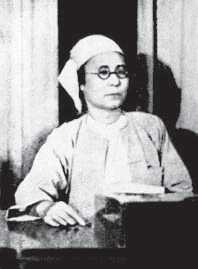Po Kya
- In this Burmese name, U is an honorific.
| Po Kya ဖိုးကျား | |
|---|---|
 | |
| Born |
23 March 1891 Nibban village, Hinthada, Pegu Division, British Burma |
| Died |
11 April 1942 (aged 51) Htantabin, Pegu Division, British Burma |
| Occupation | novelist , Educational reformer, Superintendent |
| Period | 1920–1942 |
| Genres | Short stories |
| Notable work(s) | Akha-Me Coolie Htan Chin (1937) Thibaw Min Pardawmu Ayedawbon |
Po Kya (Burmese: ဖိုးကျား, pronounced: [pʰó tɕá]; also spelled Pho Kyar; 23 March 1891 – 11 April 1942) is considered one of the top Burmese authors and education reformists in 20th century Myanmar. He is regarded as the father of Burmese short stories, a key member of the Nationalist Education movement of the 1930s and also a literary genius. His works continue to be popular with both the young and old in Myanmar.
Youth
Po Kya was born to Daw Daung and U Pe in Nibban Village, Hinthada district on the Irrawaddy delta in 1891. Educated at Lawka-dat Monastery in Nibban Village and Lay Htut Kyaung, Pho Kyar also served as a teaching assistant while pursuing his education in the monasteries. He passed the government college matriculation exam only at the age of 27 and then proceeded to Judson College (now part of Rangoon University) in Rangoon (Yangon).
National Education
During the 1920 University Students' Strike, he served on the Students' Council and began writing articles for the New Light of Myanmar, then a Burmese nationalist newspaper. He received his B.A. in 1922 and began to work as an education Superintendent.
In 1927, he founded the Myanmar Gohnyi Press and Library. When Burmese national schools were set up in 1930, in order to counter the British monopoly on higher education, Po Kya served as an education superintendent for Hinthada district and other delta areas.
Literary Work
Po Kya wrote on a wide variety of topics, his most famous being the 550 Jatakas, Pathein Yazawin, Sale U Ponya Ahtokpatti and Thibaw Min Pardawmu Ayedawbon.
Po Kya used a descriptive storytelling style with a witty undertone. He tounched on a wide variety of topics relating to 1930s colonial Burma, including Anglophiles, religion and history.
Death
Po Kya died of malaria on 11 April 1942 while fleeing the Japanese invasion during the Second World War at Htantabin in today's Yangon Region.
References
- U Po Kya Ko Dwei Wuthtu doh mya, 1999.